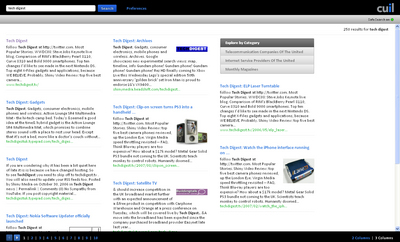Cuil – new serach engine launches from the makers of Google

A new search engine, by the name of Cuil, graced the web on Sunday and began the ever-so-long road to challenging the big players but the advantage that this one has is that it’s run by some of the key people that made Google what it is today.
While Google boasts the largest index, so far, Cuil – pronounced “cool” (no comment) – claims to do it faster, cheaper and more accurately than even the well-established giant can.
Cuil was founded by four ex-Googlers by the names of Russell Power, Louis Monier, Tom Costello and his wife Anna Patterson. Between them, they were chief technology engineers for Alta Vista, Babel Fish, IBM’s Web Fountain, the redesign of eBay’s search facility as well as being the architects of the TeraGoogle index of pages and with CVs like that, it starts to make their claims by Costello such as…
“Our significant breakthroughs in search technology have enabled us to index much more of the Internet, placing nearly the entire Web at the fingertips of every user,”
…sound really quite plausible.
Cuil aims not to be as web-link and ranking focused as other search engines and instead will present results based upon analysis of the context of pages and concepts behind people’s search enquiries, which sounds all very well and good but talk is cheap, so I had a play.
First I typed in Tech Digest and was very pleased to see that we took up the entire first page and pretty much every subsequent category. After two hours of being smug and staring at myself in mirror, I tried something a little more vague in the shape of the search “Iron Man”.
Sure enough the first page was largely about the film, including trailers at the Apple Store, but also included iron suits from films and some of the comic book stories. What is quite nice is that the results are not presented as a list but far more democratically in a grid. Presumably the results in the middle receive a better focus but it does give less of an impression of competition between results.
I then looked up to the top right area of the screen where you can narrow your search with one click – no re-enterting and redefining of text to get more specific reults required. Categories included Marvel Comics, American Comic Writers, Bodybuilders and from there you can navigate to whatever it was you were looking for in the first place much more easily than on traditional search engines.
As it goes, I was looking for the silly races about swimming until you’re sick, cycling until your bike turns to dust and running until you die. I didn’t find it on first glance but I do like the look of this.
Google has started to become slightly evil in my mind ever since they took YouTube and began removing everything that you actually want to watch, so I’m quite pleased to have an alternative, untainted way of catching a ride on the information super-highway.
Finally, I gave it the test any self-respecting tech blogger would do. I looked up “tits”.
I must say I was very pleased to see an excellent spread of European bird life, a Dr. Andre L. Tits, a five-piece-band by the name of “the Tits of Death”, a site called “indietits” on little birds who talk about obscure bands and make stupid jokes, and both high and low class pornography, and all on the first page too. All you get on Google is smut and a rather awkward looking Wikipedia entry.
Cuil indexes 120 billion web pages, three times the number that Google manages, and is, currently, blissfully ad free but don’t expect that to last. They’ve got to make money somehow.
The added bonus is that it also has the edge on its competitors in terms of privacy. It’s based on context, rather than click history, so it doesn’t make a log of users habits in quite the extended way that other search engines do.
But regardless of whether it’s a more effective tool, there’s still one hell of a mountain to climb if it intends to challenge Google. Even giants like Microsoft and Yahoo are still streets behind.
(via Reuters)
Related posts: Google Knol | Microsoft reinvents Live Search




